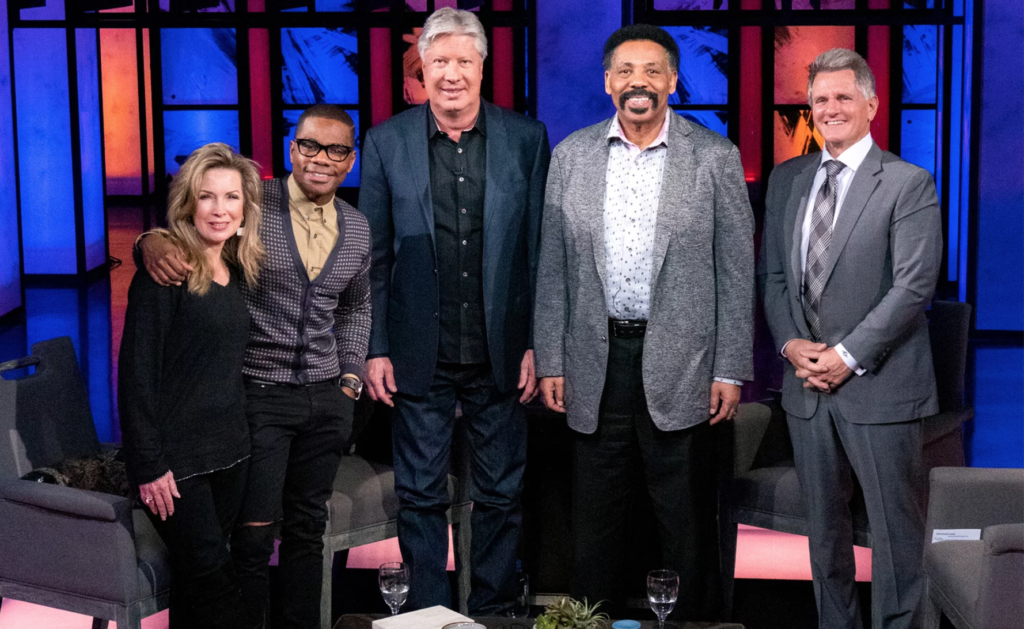
Laurie Crouch, from left, Kirk Franklin, Pastor Robert Morris, Pastor Tony Evans, and Trinity Broadcasting Network President Matt Crouch meet in early March 2020. Photo courtesy of Trinity Broadcasting Network
Gospel singer Kirk Franklin, in a discussion to be broadcast this week on Trinity Broadcasting Network, called on white Christian leaders to move beyond “kumbaya moments” and to speak from the pulpit when black people are the subjects of “social injustice happening in the streets.”
Franklin made his remarks on TBN’s “Praise” show in a conversation with the network’s president, Matt Crouch, and Dallas pastors Tony Evans and Robert Morris. Their talk is scheduled to air at 8 p.m./7 p.m. Central on Thursday (March 12) on the Christian network.
The conversation stemmed from Franklin’s announcement in the fall that he would boycott the Gospel Music Association’s Dove Awards after comments he made about race and police shootings during the GMA’s Oct. 15 awards show were edited from the show’s broadcast on TBN. Franklin, who also said that he would boycott TBN and the GMA, said that similar editing occurred when the 2016 show aired.
“This is not a conversation of me attempting to make white people feel bad for being white,” Franklin said at the start of the “Praise” show. “It is to give a bigger perspective on the heartbreaks and the hurts, that black and brown people in America are looking for the church to be a safe haven but at times it isn’t always answering to that call.”
Franklin recounted how earlier in his career a verse he wrote for a song he co-wrote with TobyMac, a white member of the Christian rap trio dcTalk, and Mandisa, a black Christian singer, was left out of the recording that played on Christian radio.
“I believe that black and brown people in this country continuously feel like they’re edited out,” Franklin said.
Minutes later, Crouch beckoned Franklin into a hug.
“Whatever happened, I want to personally apologize so that we get past this, and this program, and others like it in the future, make progress,” Crouch said. “I want to profoundly thank you for helping us understand an issue that maybe some people don’t, including us, including Robert and I.”
Crouch, who is white, also thanked Franklin for “putting this together.”
But Franklin chose not to let the moment where the two men hugged and expressed love for one another pass without clarification. He noted that “this embrace as brothers” came after off-camera discussion.
“I do know that for a lot of black and brown people, just even the optics of what just happened can be very problematic, because throughout history a lot of times white people have sometimes come across that the issues are fixed with the kumbaya moment,” Franklin said. “The kumbaya moment is really, for this generation, is antiquated.”
Evans, whom Franklin has said he consulted before making his boycott decision, described “decade after decade” of personal experiences with racism, including applying to a seminary at a time when some theological schools would only admit blacks on a “probation” status. Evans said he later was excluded from a Christian radio network because, he was told, “it would offend too many of my white listeners.”
He cited an “absence of equity,” in which the emphasis in some churches is that the “life of the unborn matters.
“But when they hear about other groups calling for other lives mattering there is a negative response,” Evans continued. “And while it is maybe legitimate to have a negative response about methodology, there should not be a negative response about mattering.”
Morris, founding lead senior pastor of Gateway Church, said he’d known Franklin for years but had not heard the story of his verse being omitted.
“When you hear this as a white Christian, your heart should break; it absolutely should break,” said Morris of Franklin’s story and other instances of racial injustice. “And then you should say to your brothers, ‘How can I be a part of the solution?’”
Morris, who, like Evans, has his own program on TBN, later said that if white clergy aren’t already discussing race in their pulpit, they should begin, as he has in recent years.
“I started teaching our people about a lack of understanding, and you don’t know that you’re prejudiced but you probably are,” he said.
Franklin noted that evangelist Billy Graham at one time criticized the Rev. Martin Luther King Jr. but later worked to integrate his crusades.
“We need to be able to see where the mistakes are, and to be willing to acknowledge them and to be agents of change,’’ Franklin said, “because if you’re not willing to get your feet and hands dirty on this issue, especially this issue, it won’t be anything but kumbaya.”
